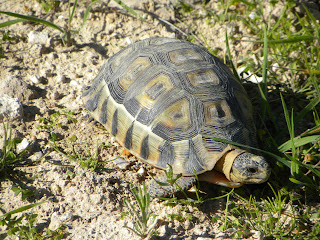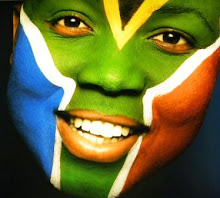One of the reasons why I applied for the job I currently have, was the possibility of travelling through Africa. It gives me the chance of going to places I would otherwise never consider spending scarce holiday time on. And that definitely applies to the Democratic Republic of the Congo, where I had to go to for a week.
I had to go to a place called Matadi, in the Western part of the country. So far away from the fights with the rebels in the Kivu provinces bordering Rwanda. In fact, the country is so big that thedistance from Matadi to those places is roughly the same distance as from my home town
to the Polish-White Russian border. And with their road infrastructure it would take weeks to
reach Matadi if they wanted to. So that leads us to two conclusions: one - I was safe from warlike violence and two - the road infrastructure of the DRC is bad.

In fact you can generalize that last statement to pretty much all infrastructure. Buildings look like they haven't been repaired in decades, which is probably also the case. The port I visited was build by the colonial power Belgium, in the early twentieth century. Since then most probably nothing was done to maintain the port in good condition. One indication would be the metal pillars supporting the quay side that were once as thick as a grown up man, and now are as thick as that man's arm. I assume this is what you get in a country that had a brutal civil war until recently and is one of the poorest in the world. How do you build up something if you don't have the building blocks to begin with?
I flew from Cape Town to Kinshasa, and then needed a short flight to Matadi. It is only 360 kilometres or so away, but because of the bad roads, you would lose too much time by driving there. You'd rather lose time, but slightly less of it, by waiting in a small airport for a flight with a blacklisted flight operator. I still haven't found out why they are blacklisted, and it was not that I had any other options, but it would have helped to know if I should be worried, or really worried. So there I was waiting for my flight with "Air Tropical".

The symbol of "Air Tropical" is a big elephant, which is probably the one creature in the whole animal kingdom that is the least likely to merily fly around. I guess "Air Tropical" can use a lesson or two in marketing. In spite of the ill chosen symbol and th
e blacklisting, wasn't really worried, to be honest. I figured that the pilots were not planning on crashing themselves, and since their job description says they have to actually be in the plane, I was convinced I would be ok flying with them. Still I couldn t help but looking at what they were doing, but that was only because I could look directly in the cockpit. It was undoubtedly the most
adventurous flight I have ever taken: a two propellor airplane with only 20 passengers, landing on an air strip consisting of trampled earth, and goats walking on it as we landed.

I was indeed safe from military conflicts, but there were potential other threats. Several exotic diseases with cool names but vicious effects were looming. For some of them I had a series of shots and a booklet to prove it. That vaccination booklet is as important as your passport, I was not allowed in or out of the country without it.
A disease you can't get vaccination s for is malaria, so I needed a way to deal with this omnipresent disease. Malaria is caused by a parasite that nests in your liver. All five types of malaria (there are 5, yes, there used to be 4 known but they discovered a new type recently) are transferred by the bite of an infected mosquito, turning that small creature into one of the most feared insects in the world. Malaria can be treated, but 2 types will never get out of your system.
You can imagine how happy I was to see the windows of my hotel room were equipped with a fine mosquito net. I was less enthused by the army of mosquitoes kept inside my room by that very net. A strategy was required. For part one of the strategy, I generously applied repellant all over me, making me smell like a giant bush of weird herbs. Secondly I wore a long sleeve shirt to sleep, and turned the airco down.

Mosquitoes only bite when the temperature is high enough. By making it nice and cold I was hoping to take their apetite away. And lastly I hopped and skipped around my room smacking and squashing as many mosquitoes as I could, wich made the walls and ceiling look like I emptied a tiny paintball gun on it
. I also improved my bruce-lee-squash, you know the one where you quickly grab a flying bug out of the air. I even made the appropriate kung fu squeels. As a final measure of precaution, I off course took malaria profylaxis (pills) and drank gin and tonic. The tonic contains kinine, a substance that makes mosquitoes not want to bite you.
With diseases taken care off, I more or less covered everything within my span of control. Bigger trouble makers that I could influence less were people. You see, the DRC is one of the countries were corruption is part of every day life. Coming from a first world country, with functioning governmental structures, functioning law and business rules, it is hard for me to deal with corruption. I don't like it, I don't condone it, I think it is wrong. But in many places where there are no structures, where law does not function an everyone is massively underpaid, corruption is a natural outcome. You give a guy a badge and he has power. You want to do something, you need a stamp or a paper from a guy with a badge.

But guess what, there is a problem or it is going to take longer than foreseen, or no no that is not possible... till a bank note appears and dissapears again. Then the papers show up, the problem is solved or they did find a solution. In other words, you need to lubricate a bit here and there. But in a poor country, a lot of lubrication is needed. And there are a lot of badges that need to provide paperwork. Who do you pay off? Who do you stand up to? How much should you give? Luckily the company provided help here. They provided a "fixer" for every transit I made in the DRC.
My fixer in Kinshasa was a middle aged, scrawny man. Neetly dressed, with spectacles balancing on a thin nose, he walked through a maze of people at the airports. Greeting many guards, talking to some, shaking hands, sometimes handshakes with bank notes in them, sometimes not. He made the process smooth. If I had to do all those things myself, it would have taken much longer and cost me dearly. I had read about travellers in the DRC having to buy their luggage back from airport personnel , or loosing their vaccination booklet because they handed it to the wrong customs officer. He also warned me not to take pictures.
I obviously had the exact opposite in mind. It turns out that the Congo is very wary of espionage. With several wars in recent past and ongoing fights I assume it is normal to be scared of any person documenting stuff. Coincidently, on my flight back to South Africa, I read in the newspaper that two Swedes were sentenced to death in the DRC, on the account of espionnage!! That could just as easily have been me! And also they had killed their driver or something, which I wasn't planning on doing, but still.
I assume you want to hear me describe what Kinshasa and Matadi were like? I am not going to spend too much time on that and let the pictures do the talking. Kinshasa is the dirtiest city I have ever visited, and that includes the cities in India. Very dusty, and soot everywhere because waste is burned in the streets and ashes mix with the sand. Traffic is a nightmare, as the roads
are in pispoor condition. But people smile a lot, and are friendly. They also like to remind me of the role of the Belgians in their recent history. Some did it to make me feel guilty, and
would be more inclined to give them almonds?, others because they seemed they finally wanted to confront a Belgian directly. Most remarcable was Yves, one of the guards at Matadi Airport. He blamed Belgium for not being a good coloniser. He said we should have left them with a Belgian language to speak, like the English did in Kenya. So I told him we were talking in French,
which is a Belgian language. But I was wrong, he said, because we speak Flamand et Wallon. How did French then end up being spoken in the Congo? He didn t know, but I was wrong and I was a bad colonist, because also - we did not found any university there. The whole conversation made me uneasy of course, but he could have made me feel much worse. In stead of telling me we should have founded universities, he could have questioned me on why "my king" came to steal copper, rubber and diamonds. Or why the Belgians choreographed the assasination of Lumumba, or why we allowed mercenary armies to cause bloodshed in his country, or why we backed up Rwandese rebel fractions invading the East, or why the Belgian army fought Arab slave traders only to start making slaves of Congolese themselves... I guess he either did not know about those dark pages in history, or those pages were written in Wallon in stead of French.
I'll start rounding off here, because I could write a lot more but I would digress from the reason of this blog. I'll just say I have seen, heard and read a lot of things which I find very fascinating.
The whole experience was a very good one, but I am glad it was not on my own account I went there. The Congo is very expensive, because everything is imported. The prices in the local supermarketare a lot higher than the ones in Belgium or Cape Town. Which is probably why someone is running a business importing goods from the Colruyt. That is right, everywhere I looked were items with the unmistakable "everyday" label, and prints in both French and Dutch. Oh, and the hotels I stayed in, even though they were average class, cost 240 EUR a night. So the plans I had of maybe making my way back to Europe in a car across the continent are put on ice for now.












 Flowers are starting to blossom, the slopes are really green after the winter rains, and the sun is pouring warmth without burning skin. Since we left in the afternoon, we planned to hike up and take the cart down. We did not check the time of the last cart down though, which almost costed us deerly.
Flowers are starting to blossom, the slopes are really green after the winter rains, and the sun is pouring warmth without burning skin. Since we left in the afternoon, we planned to hike up and take the cart down. We did not check the time of the last cart down though, which almost costed us deerly.






























